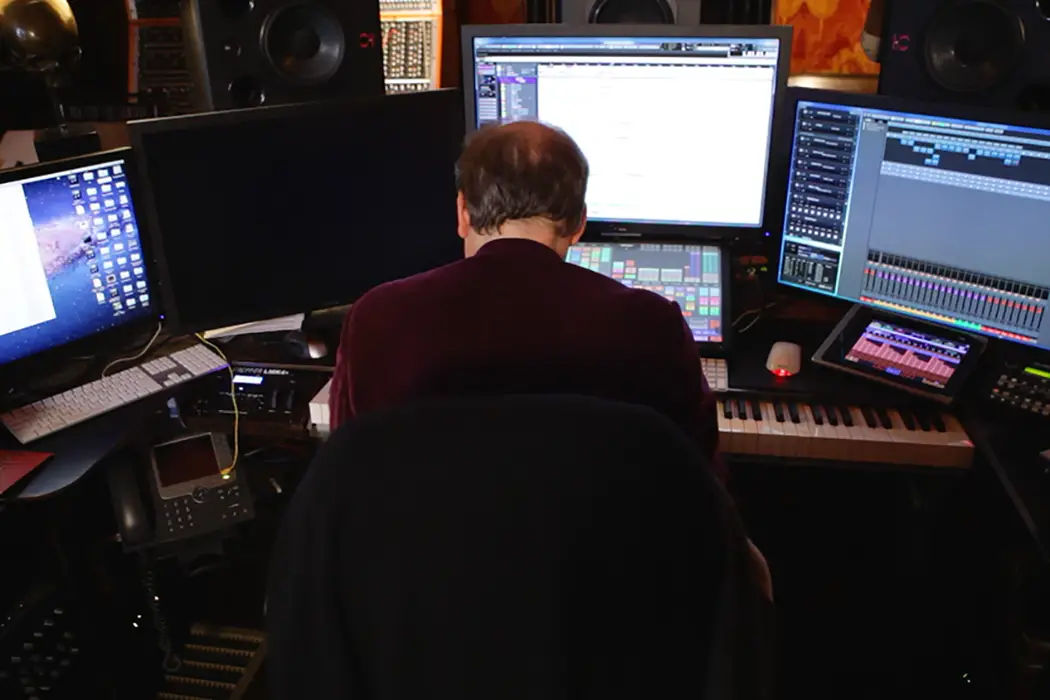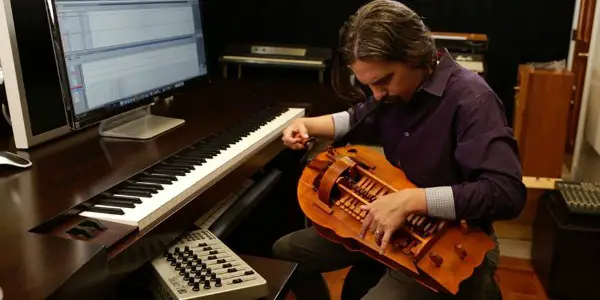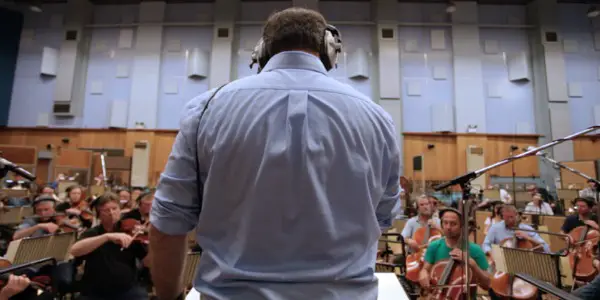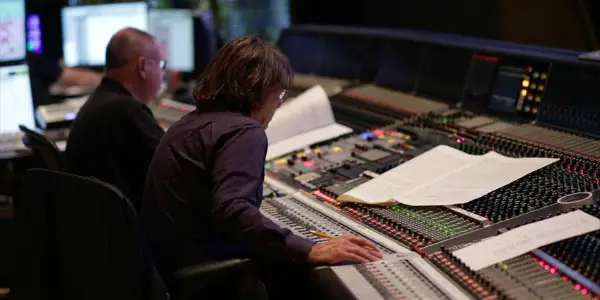SCORE: A FILM MUSIC DOCUMENTARY: An Immersive Glimpse Behind The Curtain

Alex Arabian is a freelance film journalist and filmmaker. His…
The only flawed aspect about Score: A Film Music Documentary is its brevity; writer and director Matt Schrader’s documentary will leave the audience wanting hours of more interviews, footage, and analysis into the enigmatic power of film music. The University of Southern California’s Annenberg School and School of Cinematic Arts alumnus makes an impressive debut, to say the least. “We wanted to create something that hadn’t been done before – the definitive look at the craft of film composing,” proclaimed Schrader about the inspiration behind the idea to explore film music’s influence.
With a horde of industry legends to provide insight into the art and science of their work, Score: A Film Music Documentary provides the first comprehensive documentary on the subject of film scoring. It analyzes the history of film music and its nonlinear evolution coincided with the emergence of technological innovation.
The memorable scores discussed will invoke in the viewer the same feelings they did upon the very first viewing, subconsciously emulating their initial emotional experience tied to each score as the various composers tell exactly how they did them. There are methods behind their brilliant madness, but they vary, some more drastically than others. Score will make you feel like a child again. Somehow, Schrader has done with this documentary what film music has done for its audiences for over a century; it subconsciously strikes a chord with the orchestra of the brain. Warning: elevated levels of dopamine in the brain are likely during the viewing of this film.
The Evolution Of Film Scoring Technology, Complexity, And Creativity
Through Score: A Film Music Documentary’s narrative, one can infer that technology, complexity, and creativity have a symbiotic relationship in the context of film scoring. As technology has progressed, the complexity of the music that the composers produce has deepened. It has also allowed for the talents making film music to more fully realize their creativity.

It all started with a piano organ. A Wurlitzer organ, to be exact. Music has been tied to film since its inception. Before films had sound, silent films would be composed with a Wurlitzer organ in the early-t0-mid-20th century. These organs would produce sounds that emulate the different sections of a various orchestra to stimulate a grandiose feeling in the audience.
As films became larger in scope, the music became larger in scale, with composers using actual orchestras. Eventually, music recording evolved to add more complexities to its process. Before there were advanced computers, there was sound mixing in a booth within a large recording space. Composers would conduct their own orchestral music while the director would sit in the booth.
Today, most composers have the ability to sit in the studio with the director while somebody else conducts their scores. With more technology comes added layers, higher budgets, and a longer process. With more people to handle some of the more technical work, composers have more time to sit back and excise their creative urges more fully. Throughout the composers onscreen whose processes are featured in Score: A Film Music Documentary, we see unique locations such as abandoned churches, the use of methods such as wind and the natural elements to manipulate sound, and household tools like pots, pans, and buckets, and many more behind-the-scenes looks.
The Standout Featured Composers And Recording Studios
Score: A Film Music Documentary is an exuberant, star-studded display of raw emotion conveyed through music and its creators. Because of film music’s seemingly mystical power to affect the viewer on a visceral level, scientists remain largely baffled as to what exactly accomplishes such an emotional reaction from the studio. Reliving all of the iconic scores of the past and present evokes the same feeling film music begets, and Schrader understands this completely.
In keeping a rhythm of stimulating scores, the audience is in a constant state of endorphin-induced euphoria during the viewing. Essentially, Score: A Film Music Documentary’s heart is the greatest hits of visuals, iconic scenes, their accompanied musical motifs and themes, and featured interviews.

Max Steiner, Alfred and Thomas Newman, Garry Marshall, Rachel Portman, Bernard Herrmann, Elliot Goldenthal, Jeff and Mychael Danna, Heitor Pereira, Ennio Morricone, Dario Marianelli, Trevor Rabin, Henry Jackman, Jerry Goldsmith, John Debney, Marco Beltrami, Christophe Beck, Hans Zimmer, Danny Elfman, John Williams, Randy Newman, Quincy Jones, Howard Shore, Alexandre Desplat, Harry Gregson-Williams, Brian Tyler, Atticus Ross, Bear McCreary, Mark Mothersbaugh, and many more are featured.
With them, through some archival footage compiled by Schrader, but mostly interviews that he conducted, the audience has the opportunity to hear these artists, who span almost 100 years of film music composing, influences, influencers, varying of processes involved, and overall styles. The film and music historians interviewed, Leonard Maltin and Jon Burlingame especially, do a wonderful job at providing analysis and further narration that adds to the artists’ insights.
It is truly breathtaking to see the inside of the iconic Air Studios and Abbey Road Studios, and fascinating to learn the constructional differences between the two that alter the sound of the orchestra.
If Only Schrader Could’ve Covered More Content (It’s The Greedy In Me)
You’re probably thinking all of those names seem like plenty to fill the film’s 93-minute runtime. They were indeed, but the film, naturally, only focuses on mainstream Hollywood film music. There are so many more composers that would have been a joy to see interviewed or provided archival footage of, such as Terence Blanchard (Spike Lee’s composer for the past three decades) or Duke Ellington (Anatomy Of A Murder, 1959), who would have fit perfectly into the jazz-influence sub-narrative.
More rock-inspired musicians like Trent Reznor of Nine Inch Nails, whose The Social Network score Schrader focuses on, such as The Chemical Brothers (Hanna), Eddie Vedder of Pearl Jam (Into The Wild, 2007), and frequent Nicolas Winding Refn collaborator and former drummer of the Red Hot Chili Peppers, Cliff Martinez (Drive), would have added to the rock narrative that evolves into Hans Zimmer’s current rock-infused style that is dominating the industry.
Then there is the gargantuan portion of international cinema that Schrader unintentionally ignores. Hollywood popularized film scoring as an artistic medium, but international film has such a rich musical history as well. From Goblin’s Suspira (1977) and Giallo genre scores for Dario Argento, to Ennio Morricone’s Italian work outside of American Spaghetti Westerns, Nino Rota (The Godfather, 1972), Erich Wolfgang Korngold (The Adventures Of Robinhood, 1939), Charlie Chaplin, Johan Söderqvist (Let The Right One In, 2008), and, well, I could go on forever, you get the point.
However, I suppose that would mean a higher budget, more resources, and a much longer film, which would minimize distribution options. Instead, Schrader focuses on a handful of composers to walk the viewer through the general process of film scoring, thoroughness over quantity, so to speak.
“It’s A Process, It’s A Process, It’s A Process,” Right Mychael Danna?
It’s a quote from Brad Pitt’s Billy Beane from Moneyball. It’s A Process is also the name of the song during the montage of the quote, and one of my favorite film score tracks of the last decade. Mychael Danna’s Moneyball score added a layer of poeticism to Bennet Miller’s direction and Aaron Sorkin and Steve Zaillian’s screenplay. It also sums up what film music, and filmmaking, for that matter, is all about: the process.

The role of the composer goes far beyond adding music to a film; he or she also helps flesh out the soul of a film. One of the most interesting aspects of Score: A Film Music Documentary is the collaborative process between the director and the composer. The Spotting Session is the most important part of the film scoring process; it’s when the director expresses his vision to the composer. In a sense, it is the composer’s job to immerse themselves into the mind of the director, to find out their vulnerabilities, fears, insecurities, and apprehensions. As James Cameron proclaims, it is very much a therapist-patient relationship at times.
Self-doubt, trial and error, picking an appropriate studio, and composing for each member of the orchestra ensues. The composer is telling their life story, using the film to show the world the person that they are. Each sheet of music is a love letter to the musician playing the instrument. When Schrader finally shows each featured composer’s vision come to fruition in the Final Cue, where the composer and director take one last listen to make any last-minute adjustments, the audience feels equally as proud as the composer does by seeing the emotion on their face and submerging themselves in their work.
Don’t Miss It, Or Else…
Or else you’ll be deprived of a peak behind-the-scenes of one of the most elusive art forms in the world today. Score helps cinephiles better understand film scoring. Film music represents the last people alive on earth that commission orchestral music everyday. To forget film scoring would be a loss to humanity, and that’s coming from Hans Zimmer.
Viewers will get lost in the minds of the multitude of composers interviewed, the grandeur of the recording process, and the rich history of film scoring. Schrader delves into film music by merely acting as a fly on the wall, letting the masterminds speak for themselves, creating a non-intrusive film with a pulsating heartbeat. Viewers will likely be left wanting more. Film music has such a rich history, Schrader has the potential to make Score into a docuseries. One can only hope.
Are you a fan of film music? Who is your favorite film composer? What is your favorite film score?
Score: A Film Music Documentary will be released by Gravitas Ventures on June 16 in the US and Canada.
Does content like this matter to you?
Become a Member and support film journalism. Unlock access to all of Film Inquiry`s great articles. Join a community of like-minded readers who are passionate about cinema - get access to our private members Network, give back to independent filmmakers, and more.
Alex Arabian is a freelance film journalist and filmmaker. His work has been featured in the San Francisco Examiner, The Playlist, Awards Circuit, and Pop Matters. His favorite film is Edward Scissorhands. Check out more of his work on makingacinephile.com!













